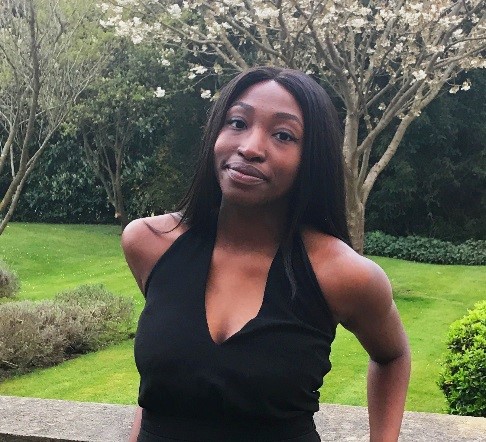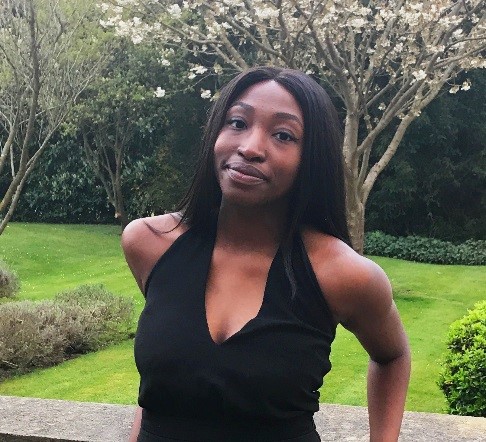
The rainy season brought rumours. Whispers of poison after a mass recall of Indomie noodles. A girl in Form 3 reappearing after several months with family in Maryland, withdrawn. Lurid headlines warned of cults, front pages daubed with blurry corpses. There were mutterings that the pastor of the Shining Light Ministry had not succumbed to a brief illness as had been announced to his congregation. Suicide. A word breathed into neighbours’ ears along pews. They said the body would never have been found if the hyacinth had not bloomed so late.
When I met Ọláídé, I was on punishment duty. Nabilah’s doing. She was being particularly vindictive after we stopped speaking; becoming a prefect had gone to her head and she’d banished me to the field to cut weeds. The elephant grass was thick, itchy against my calves as I thwacked at stalks furiously. The cutlass was too blunt. Wet ground underfoot sucked at
my trainers, spat mud up my legs and spattered the hem of my skirt. I straightened up, and peered at the school building behind me, stark white against clouds that threatened showers. My classmates would be in the canteen by now, gossiping over fried rice, cool in the air conditioning. Taking a water-warped book and an apple from my satchel, I moved towards the shade of a flame tree.
‘Aren’t you on punishment?’
A girl was looking down at me, arms crossed, a pink chit crumpled in one hand.
I shrugged and nodded upwards at the chit. ‘What did you do?’
‘Nothing! Mrs Adeyemi sent me out after I fell asleep in English.’ She stooped to pick up the discarded cutlass, gingerly pinching the blade between her fingers. ‘Isn’t this like a health and safety risk?’
I stared blankly at her. Ah-day-ye-mi. She mangled syllables.
‘I haven’t seen you around, which year are you in?’
‘Form 6. You’re Ọláídé, right? Bísí’s cousin.’
‘She’s not my cousin.’
She let go of the cutlass and dropped down beside me, loosening her tie. Ọláídé’s skirt was several inches above regulation length and when she crossed her legs, I caught a flash of black lace. I pretended not to see. She picked up my book, turning it round to read the blurb. To anyone watching from the school, we might have looked identical: two girls in in uniform,
bent over a book, hair plaited neatly in cornrows.
We’d first caught a glimpse of Ọláídé the week before, running through the veranda before she disappeared into the chemistry block.
Ngozi and I had been bickering. We were holding court in the rec yard, leaning against a low wall that fenced the pebbled square. It was the best spot for people-watching. From our perch, we could see the intricate dance of groups eddying across the yard. Girls shrieking, parting and reforming; a rippling tartan-checked shoal.
‘It’s like Parent Trap,’ Ngozi had teased, flicking through a magazine. ‘Maybe you were split at birth, Fèyí. But they sent her abroad because she’s the fine one.’
Ngozi loved reading the tatty copies of Hello and Teen Vogue that were passed around the class, even though she went on and on about feminism in Civics. She wore her hair plaited up in two tight shuku, which gave her an air of permanent scepticism. I shoved Ngozi playfully but accidentally spilled Fanta on her pressed white shirt. Priya cackled.
‘What would Chimamanda say?’ she said in a sing-song voice. ‘Not very feminist behaviour, arguing over looks.’
Priya was the class beauty. Everyone knew it would have been Nabilah if she wasn’t so dark. I’d told her this last summer, before we fell out. She’d shaken her head, leaning in close to press her finger to my lips. I was surprised by a flush of warmth in my cheeks.
Seeing Ọláídé up close, I had to admit we did look similar. Same complexion. Both lanky, quick to scowl, with slim pointed noses. But like twins, no. Her eyes, wide-set above slanting cheekbones, were a colour I had only seen on television. Later Ọláídé would tell me, laughing, that they were contact lenses.
We didn’t have any classes together, so I invited her to do yearbook committee with me so we could hang out at lunchtimes. Ọláídé liked telling stories about London. Ngozi, like me, hadn’t left the country much so we drank it all in. During these sessions, Priya made a point of tapping out messages loudly on her Motorola, flicking her hair and laughing to herself. Once, in the middle of a story, Priya put down her phone and snorted, ‘Wait, you lived in Peckham?’
Ọláídé didn’t miss a beat.
‘Well we both live in Ikoyi now, so does it really matter?’ She continued, sweet as syrup. ‘Or will you be moving to the Mainland soon? I was so sorry to hear about your Dad’s legal troubles.’
Ngozi sucked her teeth. It had been in the papers but we didn’t bring it up. Priya’s lips thinned, and her knuckles were white where they gripped the phone. I thought she would hit her.
‘At least he’s not crazy,’ she said finally.
Ngozi and I watched her as she launched herself from the wall and stalked off towards another group. Ọláídé’s smile was needle sharp. Ngozi gestured at me to follow and I felt my chest tighten. Without thinking, I drew closer to Ọláídé. Ngozi looked between the two of us, her gaze resting on Ọláídé. It was like she was seeing something for the first time: the gleam
of a shark’s fin surfacing from dark water.
*
‘It’s true,’ said the driver. ‘Dem take body and use for charm. My brother see them snatch one girl in Nsukka, they only found–’
‘What rubbish. Abeg, Mr Solomon turn on the radio,’ Ọláídé snapped. She could sound very Nigerian when she wanted to.
We had been spending a lot of time together. After school, we would walk the twenty minutes to the mall arm in arm, gisting about the day. I’d never been one of the girls who haunted the place after school. Ngozi used to call them mall rats, rolling her eyes at the daily migration of the pack. Now, I taught Ọláídé how to hiss when conductors leaned out of danfos shouting, baby girl! Ibejí! She taught me to how to roll up my skirt; where to accidentally place a hand when we bumped into St Gregs boys at the food court. I’d seen Nabilah there once. She was with a group of prefects, queuing for ice-cream at Mr Biggs. I pretended to brush something from the shoulder of a boy who until then had unsuccessfully been trying to toast me. Encouraged, he puffed out his chest and made a show of paying for my suya. Nabilah was watching and I caught her eye. She turned away. Guilt soured my stomach.
Ozumba Mbadiwe was a river. Churning water the colour of Milo rose to knee height, soaking pedestrians unlucky enough to be caught in the wake of okadas that wove through the traffic. The jeep crawled through muck, front end dipping as it hit submerged potholes, cresting waves high enough that they splashed the windows. Goosebumps prickled across my arms as I studied Ọláídé, wondering if everyone from abroad was impervious to cold.
The traffic eased up as we hit the bridge, and I looked out the window to see the bloom of water hyacinth on the lagoon. Tendrils and vines snaked across the water, multiplying across its surface and transforming it into a meadow of shifting green. It looked like you could walk across it from one end to the next, easy as crossing the road.
And people had tried. Not there. Four years ago, on the Mainland. We were miles away but I was woken up in the middle of the night by my bed itching beneath me, the horizon lit up with white flashes, low booming louder than thunder. The radio blared broadcasts about bombs, our neighbours were screaming that it was a coup. Remembering the Abacha days Mummy dragged me and Daddy into the sitting room, kneeled down and prayed with a fierceness that brought tears to her eyes. Fleeing the flames, hundreds of people stampeded across what looked like scrubland in the darkness. In the weeks that followed, fishermen as far away as Snake Island hauled in schools of bodies in their nets, flesh sliding from bone.
Ọláídé lived on a tree-lined street in one of the older parts of Ikoyi. As we drove through the gate, I gaped at the house: four gold-veined columns fronted the façade, the portico’s roof intricately decorated with a relief of the crucifixion. A fleet of cars was lined up beneath sunbleached awnings, each covered by dusty tarpaulin. Water trickled from the mouth of a stone lion crouched in a large fountain. Things clicked into place. The only people who live like this are pastors and politicians.
The car stopped and I thanked the driver, hurrying to undo my seatbelt. Ọláídé had already slammed the door behind her and was running through the front door.
‘Mummy! I’m back!’
I hovered in the hallway, unsure whether to take off my shoes. Everything was shiny. A plump woman in a starched adire uniform tried to take my bag. She called me ma. More sharply than I intended, I refused and held my satchel tight to my chest. She looked old enough to be my grandmother.
Voices floated down the corridor, the clack of high heels on marble. I felt soft arms around me and I was wrapped in a cloud of scent. Cloying, like too sweet roses. And underneath that, something sour; a smell like hospital corridors.
‘Good afternoon, Aunty.’ I tried to disentangle myself and greet her properly, but she pulled me up.
She and Ọláídé had the same slanted eyes, the same heart shaped face. But something about her features was indistinct, like I was looking at Ọláídé through fathoms of rippling water.
‘My dear, don’t do that. You make me feel old.’ She pronounced every word carefully, as if she was trying to hide a speech impediment.
‘Mummy, can’t you stay?’ Ọláídé, wheedling, her arms crossed, petulance making her look five years younger.
The corners of her mother’s mouth twitched upwards, attempting a smile. I noticed that her wig was slightly off-centre and tried not to stare.
‘I’m going to be late for my appointment. Lovely to meet you, Fèyíkemi,’ she said, ‘I’ve heard so much about you.’ She floated down the hallway. The front door shut behind her with a gentle click.
Ọláídé showed me around the house, listing off the rooms with studied disinterest. Kitchen, guest room, dining room, games lounge, laundry room. She pulled me away from the study when I tried the door. I wanted to see more, but she insisted on showing me the garden. It was large, fringed by a low hedge dotted with bright red flowers. I listened to the rhythmic clip of shears mingling with waves that lapped against the jetty at the end of the lawn. The sound of horns carried faintly across the lagoon. And above that, a descant trill of bird song. I didn’t know Lagos could be so quiet.
Flame-like petals lined the path to the jetty, releasing soft clouds of scent when they were crushed underfoot. Gravel gave way to planks, half-rotted with age. Worn tyres were lashed to the jetty’s foundation, home to colonies of small fish that darted in and out of torn water sachets, fragments of coloured plastic and squashed takeaway containers that rose and sank
with low swells. We sat on the edge, thighs touching, and swung our legs out over the water. Ọláídé produced a packet of cigarettes and lit up.
Since the incident with Priya we’d taken to smoking behind the equipment shed at lunchtimes. Ọláídé figured that if we were ever caught we could say the smoke came from rubbish burning in the compound next door. It was one thing to sneak smokes in school. I’d never heard of anyone who would dare to do this at home. I would be slapped into the afterlife if Mummy knew what we’d been up to. Ọláídé seemed unconcerned and passed the
cigarette to me. ‘Did Emeng really knock her gateman?’
I laughed, ‘It’s knack not knock.’
‘Well I get points for trying.’
‘You’re so oyinbo, they didn’t teach you anything in Jos.’
‘I learned some things,’ Ọláídé smirked at me. I passed the cigarette back and she took a long draw, tilting her head back as she breathed out long coils of smoke. Then she blew a perfect ring.
‘Our dorm captain taught me that. She could be a real bitch, but she was cool.’
This was more forthcoming than she’d ever been about her stint in boarding school. We’d all assumed she was fresh off a plane since she joined halfway through the term, but she’d actually moved to Nigeria over a year earlier. Bísí had been tight-lipped when I’d asked about it in the canteen.
‘It was because of a family thing,’ she’d said, not looking up from her plate of puff puff. Bisi was fair enough to look Igbo, but had a thick Yoruba accent.
‘Is she actually your cousin?’ I’d pressed.
Out of the corner of my eye, I saw the girls sitting next to us nudge each other. The volume of their conversation dipped noticeably.
‘Ehn, but not by blood. Shò mó pé Jand people are so stand-offish. Her Mum married –’ She clocked the eavesdroppers and caught herself. ‘Shébì ọrè ẹ nì? Ask her yourself.’
I put the cigarette to my lips and didn’t inhale. I could taste Ọláídé’s strawberry lip balm.
‘Tell me something you’ve never told anyone before.’
Ọláídé looked at me, amused. ‘Like what, my pin code?’
I shook my head, ‘No. A secret.’
She was quiet for a long while, staring out over the lagoon.
‘My step-father didn’t die the way they said he did. In the news and stuff.’
I had figured that much out. The lion in the garish fountain at the front of the house was a giveaway. It was part of a crest that until recently had been splashed across billboards and posters all over the city. Always beside a bearded man who gleamed with the offerings of a devoted ministry – Rolex on his wrist, Bible in hand.
Ọláídé fingered the beads of her bracelet. I gave her a sympathetic squeeze.
‘People here…they don’t know how to talk about these things,’ I said, struggling to find the right words, ‘You know, mental issues.’
She gave a short laugh, ‘The bastard didn’t kill himself.’ Ọláídé waved at the house behind us, ‘Doesn’t all this tell you what kind of a person he was? He was the reason we left London. Mum wasn’t even religious. He was all smiles and presents when he visited.’ Her jaw tightened, ‘As soon as we moved here he started hitting her. I told him if he did it again I would kill him. That’s when they packed me off to Jos.’
There were clouds rolling in from the direction of the Island, heavy with rain. The wind picked up, carrying with it the scent of brine.
‘And did you? Kill him.’
Ọláídé lit another cigarette.
‘Tell me what’s going on between you and Nabilah and I’ll answer that.’
I froze. A spike of panic almost doubled me over. How did she –
‘Jesus, chill out,’ she put her hands on my shoulders, shaking me, ‘I don’t care dummy.’
I felt the tension leave my body. Ọláídé handed me the cigarette and I looked at my feet as I inhaled, not wanting her to see the tears pricking.
‘You know my Mum told me a story about the water hyacinth. How they got here. When white people came to the creeks, a long time ago, it pissed off the gods. Yemoja in particular.’ Ọláídé’s voice was dreamy, eyes far way. ‘These were her waters. They choked up her alters with stinking oil, and killed her fish. Polluted her temples with the blood of innocents. In a rage, she wept for forty days and forty nights. Her tears turned to vines that wove themselves across streams, rivers and lakes. Every year, she remembers the insult of the invaders and the hyacinths bloom again.’
‘Isn’t that like juju?’
Ọláídé sniffed at me, ‘You watch too much Africa Magic.’
And then the clouds broke, soaking us with warm rain. That night I would dream of the pastor, empty eye sockets trailing leaves, hyacinth vines ensnared around his suit. Of lagoon water filling a mouth that spat hate and fishes nibbling fists that broke skin. It was a sweet sleep.

Arenike is a London based writer who grew up between Lagos and the UK. She is a recent graduate of Cambridge University. Her writing is influenced by the work of Akwaeke Emezi, Toyin Ojih Odutola and Lynette Yiadom-Boakye. Twitter: @arenikea




4thestatebooks